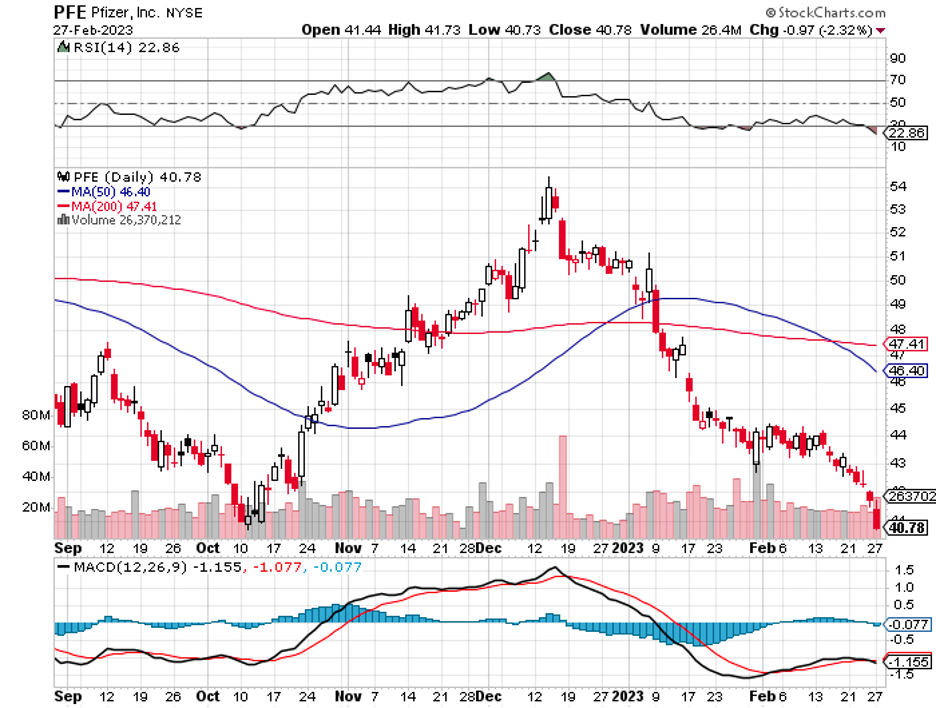No Rest for the Weary
Pfizer (PFE), along with its partner BioNTech (BNTX), developed one of the first COVID-19 vaccines to receive emergency use authorization from regulatory bodies worldwide. The Pfizer-BioNTech vaccine has been highly effective in preventing COVID-19 infection and has played a significant role in the global effort to curb the pandemic.
In addition to its vaccine, Pfizer also developed a COVID-19 treatment called Xeljanz, which has shown promising results in clinical trials. Xeljanz, originally developed to treat rheumatoid arthritis, is an oral medication that works by blocking a molecule involved in the immune response, which can reduce the risk of severe illness and death in some COVID-19 patients.
The Pfizer-BioNTech vaccine and Xeljanz have contributed to the company's financial success during the COVID-19 pandemic. In fact, this lineup made up the bulk of Pfizer’s operational growth of an impressive 30% year over year, pushing the company’s sales in 2022 to a whopping $100 billion.
But now that the pandemic has come to an end, Pfizer faces a massive revenue hit. With its boatload of cash, however, the company is in excellent shape and position to make an acquisition.
The latest name under Pfizer’s radar is Seagen (SGEN).
This is the second time Seagen has found itself the center of acquisition reports. In 2022, the biotech was said to be in serious discussion with Merck (MRK). At one point, Merck reportedly offered $200 per share, but the talks fell apart because neither party was happy with the final price.
Now it’s Pfizer’s turn to pitch its offer. The Big Pharma company is said to be in discussions to buy the cancer-focused biotech for a deal worth more than $30 billion.
This deal could prove to be a boon for Pfizer as the company sustains its momentum and continue to boost its portfolio and late-stage programs. Aside from the waning sales of its COVID products, it also faces a patent cliff as some of its blockbuster drugs will soon lose their exclusivity.
Seagen focuses on a group of cancer therapies called antibody-drug conjugates, or ADCs.
Basically, ADCs are a type of cancer treatment that combines the specificity of antibodies with the potency of chemotherapy. ADCs consist of three components: an antibody that targets a specific cancer cell marker, a cytotoxic drug that kills the cancer cell, and a linker that connects the two components.
Once the ADC is administered to the patient, the antibody portion of the ADC selectively binds to the cancer cell surface marker. Then the entire ADC is internalized into the cancer cell. Once inside the cancer cell, the linker is degraded, and the cytotoxic drug is released, killing the cancer cell.
The advantage of ADCs over traditional chemotherapy is that they are more selective and can target cancer cells more precisely while minimizing damage to healthy cells. ADCs have shown promising results in clinical trials and are currently approved for the treatment of several types of cancer.
In 2019, Seagen received FDA approval for its ADC named Padcev. The treatment raked in $451 million in 2022, but sales are projected to reach $2.4 billion in 2027.
Since Merck has been working on its own ADCs, a Pfizer acquisition of the sought-after Seagen seems likely as it would not attract anti-trust investigations.
One of the main reasons Big Pharma names are fighting over Seagen is the biotech’s revenue forecasts. By 2026, Seagen is projected to rake in $5 billion in revenue and peak at $9 billion by 2030.
Aside from Padcev’s current indication, Seagen has been working on how it could be used as a combo treatment alongside Merck’s top-selling Keytruda to target bladder cancer. The company also queued the drug for several trials. These would boost the company’s $2 billion annual revenue and $30.1 billion market value if approved.
Pfizer has been sitting on a massive war chest thanks to the success of its COVID programs. Despite its impressive cash flow, the company has no time to rest as it scrambles to ride the momentum and ensure that all its progress doesn’t go to waste.
Since then, the company has been aggressive in striking deals, including its $11.6 billion purchase of Biohaven Pharmaceuticals, which came with a top-selling migraine treatment, and its $5.4 billion agreement with Global Blood Therapeutics, which brought with its rare hematological therapies.
If Pfizer buys Seagen, it will mark the most significant deal since the Big Pharma’s acquisition of Wyeth for $68 billion back in 2009.
Pfizer disclosed that it plans to add $25 billion to its annual revenue via business development agreements at the end of the decade as it aims to mitigate the projected $17 billion loss from its products going off-patent. Considering that the company would buy Seagen shares at a premium, the deal would be a win-win for both parties.


